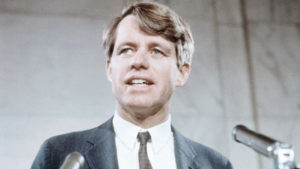I cannot help but feel wistful — and sad to this day — when I watch videos of the late Sen. Robert F. Kennedy.
Indeed, it is the coarseness of today’s debate that makes wish we had another RFK on the horizon, waiting to grab our attention, speak to our better angels, prod us to think beyond our own self-interest.
This video comes from a 1967 interview that Bobby Kennedy had with “Face the Nation” questioners. His answers were full, complete and yes, a bit wordy at times. He spoke about the Vietnam War, which was Topic No. 1 on all the TV news talk shows in that era.
RFK waffled during this interview about whether he would be a candidate for president in 1968. He straddled the fence until the moment in the New Hampshire Democratic primary when Sen. Eugene McCarthy came shockingly close to upsetting President Johnson.
In came Bobby Kennedy. His campaign launched and in March 1968, LBJ shocked the nation by declaring he would “not seek” nor would he “accept my party’s nomination for another term as your president.”
I want to hear RFK’s wisdom again. Today’s political debate has devolved into insults, innuendo and an utter lack of compassion, particularly when it comes from the White House. I always have thought we are better than that. We deserve better than what we’re hearing in this era.
Then I look back at 1968, a terrible year for this country. The Vietnam War was killing hundreds of Americans each week. RFK sought an end to a conflict in which he — as attorney general during his brother’s administration — was a key architect.
RFK spoke to us at a level we haven’t heard since his death in June 1968 at the hands of an assassin. He told us stark, brutal truth about the bitterness and division that tore at our nation.
RFK had the “it” factor that is difficult to define. It is missing throughout the ranks of those who might seek to become the next president. It most certainly is nowhere to be found anywhere near the individual who currently holds that office.
It’s been more than 50 years since Robert Kennedy left this good Earth. I miss him every day. I miss him especially when I have to swallow today’s toxic mess that comprises political debate.

